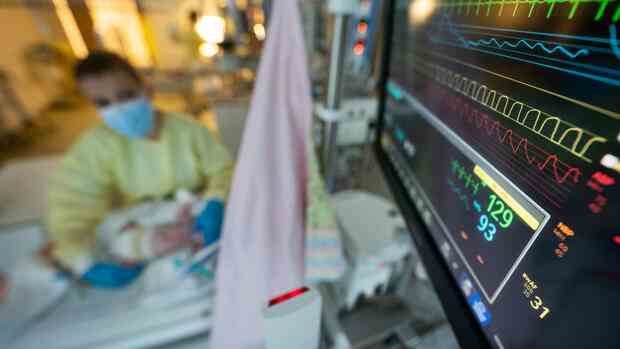Federal Health Minister Lauterbach wants to eliminate bottlenecks in pediatric medicine.
(Photo: dpa)
Berlin In view of acute bottlenecks in pediatric medicine, Federal Health Minister Karl Lauterbach wants to take countermeasures, some of which are far-reaching. “We will not allow the children who gave up a lot during the pandemic not to get the care they need now,” said the SPD politician in Berlin.
It is planned to finance more nursing staff in clinics and to better reward overwork in overworked practices. For example, children’s hospitals should be able to recruit freelance nursing staff and be able to bill one hundred percent. For doctors in children’s practices, additional services should be fully rewarded according to fixed prices and without discounts – without budget upper limits.
Lauterbach also did not rule out that in a next step, if necessary, planned interventions for adults could be postponed. Child care will be ensured “whatever is necessary for it,” he said. Measures against delivery bottlenecks for medicines, which Lauterbach wants to present in the coming week, are also to come.
Meanwhile, the traffic light coalition tied the billion-euro energy aid program for clinics and care facilities to conditions on the last few meters. This emerges from a stipulation decision of the Budget Committee. The aid is therefore associated with a bonus and dividend ban and energy saving goals.
Top jobs of the day
Find the best jobs now and
be notified by email.
A total of eight billion euros are available for the package that the Bundestag approved on Thursday. Lauterbach had previously promised several times that “rising energy costs will not endanger the operation of the hospitals”. Facilities have few opportunities to save on energy costs. According to reports, the Federal Ministry of Health is said to have tried to prevent the conditions for energy saving targets that have now been decided.
>> Read here: Clinics in the energy price crisis: “Cannot force patients to put on a sweater”
In the stipulations, however, it says that energy-related renovations and savings in energy consumption are “central to the future viability of hospitals”. According to the decision, the aid planned for 2024 can therefore be reduced by 20 percent if the clinics cannot provide any energy advice or concrete savings measures.
The SPD politician sees little potential for saving energy in the clinics.
(Photo: IMAGO/Political Moments)
The budget holders are also calling on the federal government to submit a report on the energy-saving measures in the clinics by the end of March 2024 and to enter into talks with the federal states that are responsible for financing the energy-saving refurbishment of the clinics.
In addition, the householders point out that “the regulations made for the payment of bonuses and dividends are also applied to hospitals and care facilities”. Anyone who receives more than 25 million euros in aid may no longer increase bonuses and dividends that have already been agreed. Bonuses and dividends should no longer be paid out at all from 50 million euros.
The Greens budget politician Paula Piechotta sees the responsibility above all in the federal states, “because the complete financing of thermal insulation and building renovation is the core task of the states,” she told the Handelsblatt.
The head of the German hospital company DKG, Gerald Gass, also pointed out that the “biggest economic problem facing hospitals”, namely the increased prices beyond energy costs, is still “completely unresolved”. The federal government is only partially reducing the risk of insolvency.
More: Lauterbach plans billions in aid for clinics and care
